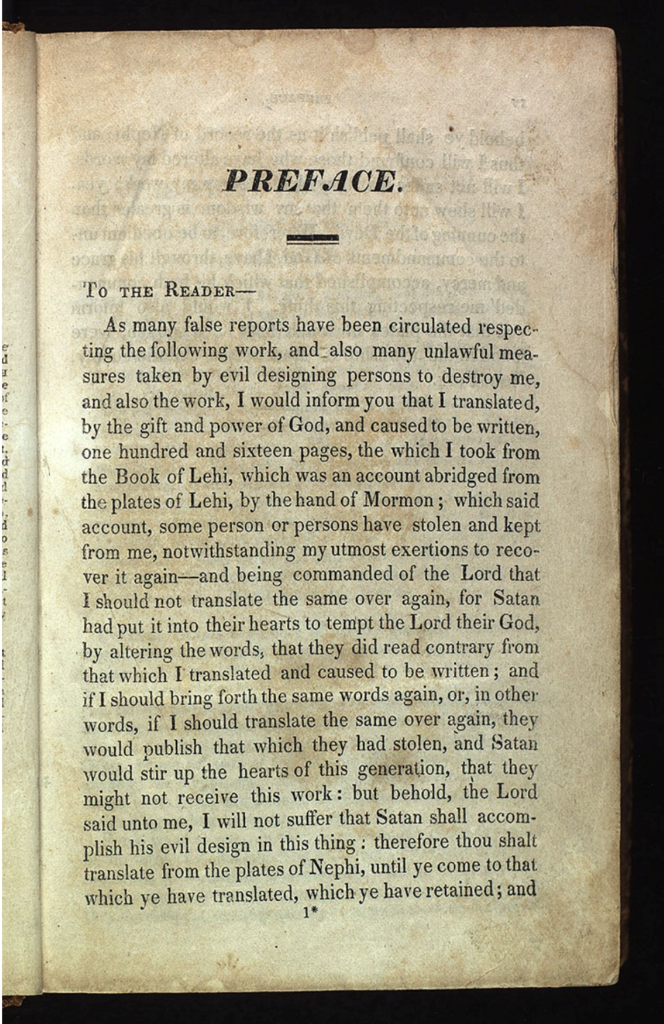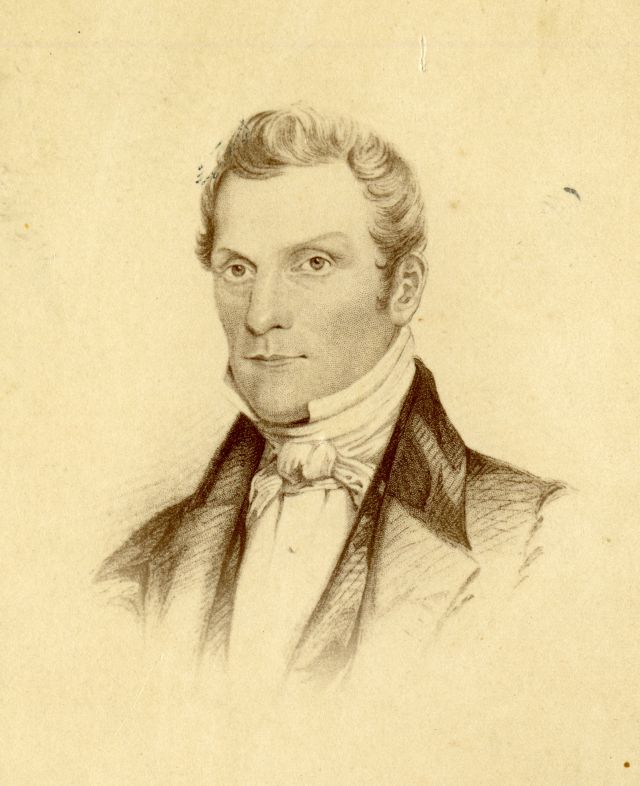Section 10

If Joseph Smith’s revelations were ranked in order of coolness, section 10 would rank near the top. I don’t mean to be irreverent about it, but it’s a little like watching a duel or a dance off between the devil and the Lord. He even puts it that way–“I will show . . . ,” he says. Who will win? And what kind of impressive moves will it take?
With Oliver as scribe, Joseph began translating in the Book of Mosiah, where he and Martin had left off before losing the manuscript. As they went, Joseph worried about the lost beginning. Should he translate it again?
No, the Lord answers in section 10.
He adds instructions about how to proceed, an omniscient explanation for his answer, and assurance that nothing vital was lost.[1]
In section 10 the Lord describes a conspiracy against Joseph and the Book of Mormon. He exposes Satan’s attributes and tactics and the “servants of Satan” who “uphold his work” (D&C 10:5). Satan inspired conspirators to steal the manuscript from Martin, the Lord explains. They are waiting to see if Joseph publishes the same manuscript. If so, they’ll alter the stolen manuscript and claim he has no gift. If not, they’ll publish the stolen manuscript and claim Joseph has no gift. They will steal and lie for the glory of the world and destroy Joseph in the process. But the Lord clues Joseph in to the conspiracy and helps him thwart it.
The Lord cautions Joseph to not reveal his knowledge of the conspiracy until the Book of Mormon is translated because he can’t always tell who is trustworthy. With that caution, the Lord reveals to Joseph that the Book of Mormon plates contain a back-up copy of what was lost. “Remember,” the Lord says, “it was said in those writings that a more particular account was given of these things upon the plates of Nephi?” Joseph should therefore translate the small plates of Nephi until he gets to the reign of King Benjamin. The conspirators only stole a translation of part of Mormon’s abridgment of Nephi’s writing. Publishing the translation of Nephi’s own small plates will derail the conspiracy, demonstrating in the process that God’s “wisdom is greater than the cunning of the devil” (43).
Section 10 gives us Christ’s embracing view of Christianity.
The Lord affectionately refers Christianity in general as “my church.” Section 10 was revealed well before there was a restored Church of Jesus Christ. The revelation teaches us to think of the Savior’s restored church as the redemption of Christianity. By calling Joseph Smith and keeping promises made to the Book of Mormon engravers to bring forth their words, the Lord is building Christianity, not undermining it. Christians need not fear. They will inherit God’s kingdom. It’s those who “build up churches unto themselves to get gain” whom the Lord promises to disturb (D&C 10:55-56).
Section 10 illustrates that God is both omniscient and benevolent. Satan uses his influence to blind, to enslave, and to deceive. The Lord uses his power to bless, to save, and to preserve our agency. Theologians have long wrestled with the assumption that if God is all knowing, there can be no such thing as individual agency. The whole script of human action must have been predetermined, this assumption goes, and therefore we have no power to stray from it. One alternative is to believe in a less than omniscient God. Section 10 presents a refreshing alternative. The Lord shows how he uses his foreknowledge to preserve and protect individual agency and simultaneously keep his promises.
The Lord promised the Book of Mormon engravers that their descendants would receive their writings. He called fallible free agents, Joseph Smith and Martin Harris, to bring to pass that promise. Joseph and Martin chose to disregard the Lord’s will and lost the manuscript as a result.
Can God keep his promise to the Lehite prophets and still allow Joseph and Martin agency to obey or disobey his commands?
Section 10 answers yes and illustrates how. Knowing that Joseph and Martin could choose to disobey him and that, if so, Satan could seize that opportunity to undermine the Book of Mormon’s power to bring souls to Christ, the Lord commanded Nephi to prepare alternative plates without his knowing exactly why (1 Nephi 9). Nearly a thousand years later, the Lord commanded Mormon to include those plates with his edition of the others. “I do not know all things,” Mormon wrote about that, “but the Lord knoweth all things which are to come; wherefore he worketh in me to do according to his will” (Words of Mormon 1:7).
Joseph and Martin did not have to disobey the Lord, but now in case they did the Lord could keep his promise without compromising their agency. How many permutations are in the intricate plan of salvation? How many backups has the Lord prepared? Who knows? Only an omniscient God could truthfully assure us in such certain terms that “the works, and the designs, and the purposes of God cannot be frustrated, neither can they come to naught” (D&C 3:1).
Section 10 not only restates that guarantee, it shows how God fulfills it. The Lord could have told Joseph what to do with a few words: Don’t retranslate the part you lost. To our delight, however, the Lord uses section 10 to show, not just tell. “I will show unto them that my wisdom is greater than the cunning of the devil” (10:43).
Joseph relied on section 10 to write the preface to the original edition of the Book of Mormon (see above).
I like to imaging the scene of cunning conspirators, proud of their fool-proof plan to expose Joseph. They walk boldly into Grandin’s bookstore on Main Street in Palmyra, pick up one of the copies of the leather-bound Book of Mormon, smelling the ink, glue, and calfskin. Eager to see what is says so they’ll know which of their sinister plans to enact, they open and read the preface. Quoting and paraphrasing section 10, it reveals their plot and foils their plan. They sheepishly close the book, put it back, slink out the door, and are never heard from again.
But the Book of Mormon makes its way, converting a few, then hundreds, then thousands, and eventually reaching every nation, kindred, tongue, and people with its witness of Jesus Christ. It fulfills God’s promises to the Lehite prophets without coercing Joseph or Martin in the process. Who is the mastermind behind section 10? It’s either Joseph Smith or an omniscient God capable of guaranteed plans with endless permutations that preserve both individual agency and divine promises.
Section 11

Father Smith returned home from his Spring 1829 visit to Joseph with a revelation in hand saying he was called to the marvelous work. Joseph’s younger brother, Samuel, returned home a few weeks later having been baptized and “greatly glorifying and praising God, being filled with the Holy Spirit.” Older brother Hyrum wanted to get in on the action. He went to Joseph’s place in Pennsylvania and asked what the Lord had in store for him. Wait, the Lord replied.[1]
Section 11 includes all of the anticipation of section 4 and later revelations, and it commands Hyrum to take part. But the Lord restrains Hyrum in this revelation. Unlike his father, Hyrum is not yet called to preach but rather to wait until he has the Book of Mormon and the restored church. Then, as Hyrum desires, he will be a successful preacher of the gospel. For now he should keep the Lord’s commandments, be patient, appeal to the Spirit, and cleave unto Christ wholeheartedly in order to assist with the printing of the Book of Mormon. “Be patient until you shall accomplish it,” the Savior tells him.
It could have been disappointing for Hyrum to be told to study and wait while everyone else, it seemed, was doing more exciting work. But he was simply to keep the commandments as best he could. He was not to declare the Lord’s word but to obtain it. Then his tongue will be loosed and then, if he desires, Hyrum will be full of the Spirit and the Lord’s word, the power of God to convince many. So for now Hyrum should not preach but study the scriptures.
This revelation channels Hyrum’s zeal.
He is like a wild horse. Here the Lord bridles him, careful not to break his spirit but to train him. This revelation gives Hyrum, and since him so many others, the formula for becoming successful preachers of the gospel. Having the Lord’s conditional promise of power to convince by the Spirit if he will first learn the gospel, Hyrum spent a year searching the scriptures and helping with the publication of the Book of Mormon.
When the Lord spoke to him again in April 1830, the Book of Mormon was printed, the church was restored, the marvelous work had come forth, and Hyrum had knowledge to pair with his desire to declare the good news. Having been promised in May 1829 that the Lord would loose his tongue if he would obtain the word, Hyrum learned in April 1830 that his “heart is opened, thy tongue loosed; and thy calling is to exhortation” (D&C 23:3).
Section 10 notes
[1] “Revelation, Spring 1829 [D&C 10],” The Joseph Smith Papers, accessed July 21, 2020, https://www.josephsmithpapers.org/paper-summary/revelation-spring-1829-dc-10/1.
Section 11 notes
[1] “History, 1838–1856, volume A-1 [23 December 1805–30 August 1834],” p. 19, The Joseph Smith Papers, accessed July 22, 2020, https://www.josephsmithpapers.org/paper-summary/history-1838-1856-volume-a-1-23-december-1805-30-august-1834/25.
The post Come, Follow Me: Doctrine & Covenants 10, 11 appeared first on Steven C. Harper.
Continue reading at the original source →



